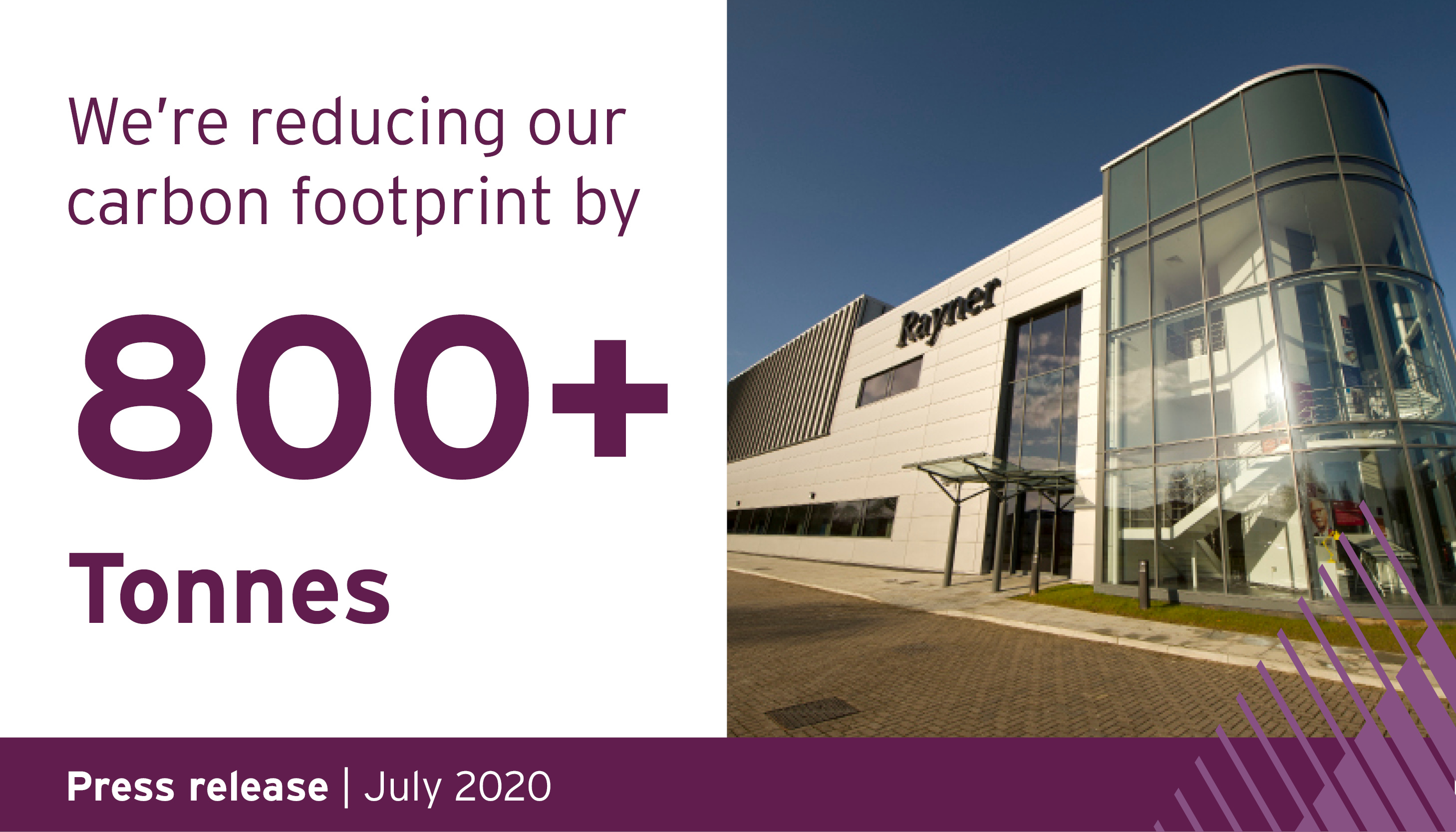
Rayner to Lower Carbon Footprint by More Than 800 Tonnes Over 5 Years
Posted on 22/07/2020
For immediate release
Worthing, UK, July 22, 2020 – Rayner, the only UK manufacturer of Intraocular Lenses (IOLs) for treating cataracts and a winner of the 2020 Queen’s Awards for Enterprise (Innovation), announced today that changes to their manufacturing and packaging procedures will reduce CO2 greenhouse gas emissions by more than 800 tonnes over the next 5 years.
The reduced CO2 greenhouse gas emissions are the result of three dedicated waste-reducing projects:
- Revising manufacture of the RayOne Hydrophobic IOL so that 26,200 litres of Isopropyl alcohol (IPA) will now be internally recycled annually (saving 91.9 tonnes of CO2 greenhouse gas emissions annually); Rayner also wanted to reduce IPA consumption so it could instead be diverted to medical hand gel manufacturers to help combat COVID-19.
- Completely removing single-use plastic from its IOL manufacturing process, saving 7 tonnes of plastic/14 tonnes of CO2 greenhouse gas emissions annually.
- Updating packaging across the entire RayOne IOL portfolio, saving 27.8 tonnes of single use plastic/55.5 tonnes of CO2 greenhouse gas emissions annually.
The above annual savings figures have been averaged out based on projected 5 Year volumes.
Rayner CEO, Tim Clover, said “Everyone at Rayner takes our responsibility to reduce waste and the use of plastics seriously. Furthermore, this is something we know surgeons and patients also care deeply about. By careful re-design and bold decisions, we have been able to retain all the features of RayOne which make it so popular, but dramatically reduce its environmental impact. Surgeons can expect to see the updated RayOne packaging over the next few months.”
Rayner continues to look for waste-reduction opportunities and has already introduced changes within its global head office in Worthing, including: switching to recycling collectors that send zero waste to landfill, and introducing reusable cups for every member of staff, saving almost 120,000 disposable cups annually.
[ENDS]
Concern for Ophthalmic Surgery Sustainability
In a weekly poll of US eye surgeons by Market Scope, almost 30% of respondents rated their concern on the impact of waste being produced from ophthalmic surgery as 5 (very concerned) on a 1-5 scale1.
Addressing the issue in the UK, The Royal College of Ophthalmologists published an Ophthalmic Services Guidance, “Sustainability in Ophthalmology” in 2013 2.
Method for Calculating CO2 Greenhouse Gas Emissions Figures
To calculate CO2 greenhouse gas emission figures for plastic, Rayner used 2 kg CO2 per kg plastic produced3.
CO2 greenhouse gas emission figures for IPA were calculated at 3.5 kg CO2 / Litre4.
About RayOne Fully Preloaded IOL Injection System
RayOne is a true, fully preloaded micro incision cataract surgery (MICS) injection system available preloaded with a full range of monofocal and premium lenses.
About Rayner
Rayner designs and manufactures Intraocular Lenses (IOLs) as well as other ophthalmic solutions for use across the cataract patient clinical pathway. In partnership with Sir Harold Ridley, Rayner made the world’s first intraocular lens in 1949.
With over 70 years of continuous growth and experience, we remain at the forefront of innovation. We are focused on providing the best visual outcomes for clinicians and patients, and are driven by science to improve performance and safety.
Headquartered in Worthing, United Kingdom, Rayner markets its IOL portfolio and related products worldwide in over 80 countries through a network of distributors as well as direct sales teams in the United Kingdom, USA, Germany & Austria, Italy, Spain and Portugal.
For general enquiries or to arrange an interview, please contact Claire Scully, Global Marketing Communications Manager (ClaireScully@rayner.com).
Not all Rayner products are approved for sale in every country. Please contact your local Rayner distributor for details of which products are available in your area.
©2020 Rayner Intraocular Lenses Limited. RayOne is a registered trademark of Rayner. EC 2020-52 07/20
References
- Source: 2019 Market Scope Weekly Polls of US Ophthalmologists
- The Royal College of Ophthalmologists, Ophthalmic Services Guidance. Sustainability in Ophthalmology Executive Summary. https://www.rcophth.ac.uk/wp-content/uploads/sites/5/2014/11/2013_PROF_222_Sustainability-in-Ophthalmology-May-2013.pdf (cited Linnehan, R. Measures needed to reduce impact of cataract surgery’s high carbon footprint. Ocular Surgery News, 2016. https://www.healio.com/news/ophthalmology/20160714/measures-needed-to-reduce-impact-of-cataract-surgerys-high-carbon-footprint)
- Zheng, Jiajia & Suh, Sangwon. (2019). Strategies to reduce the global carbon footprint of plastics. Nature Climate Change. 10.1038/s41558-019-0459-z (cited https://www.researchgate.net/publication/332428113_Strategies_to_reduce_the_global_carbon_footprint_of_plastics)
- https://www.sciencedirect.com/science/article/pii/S0306261917310255